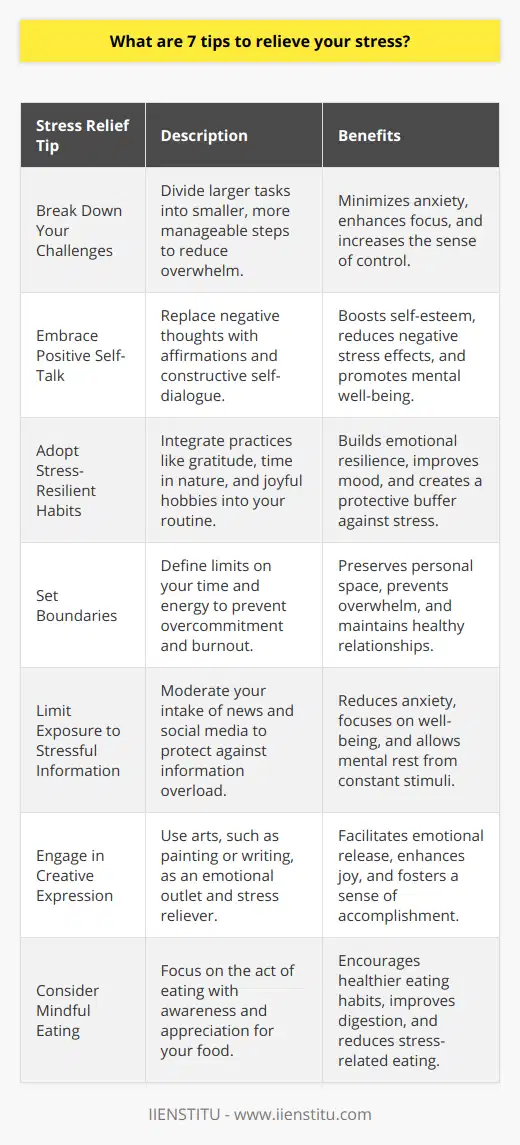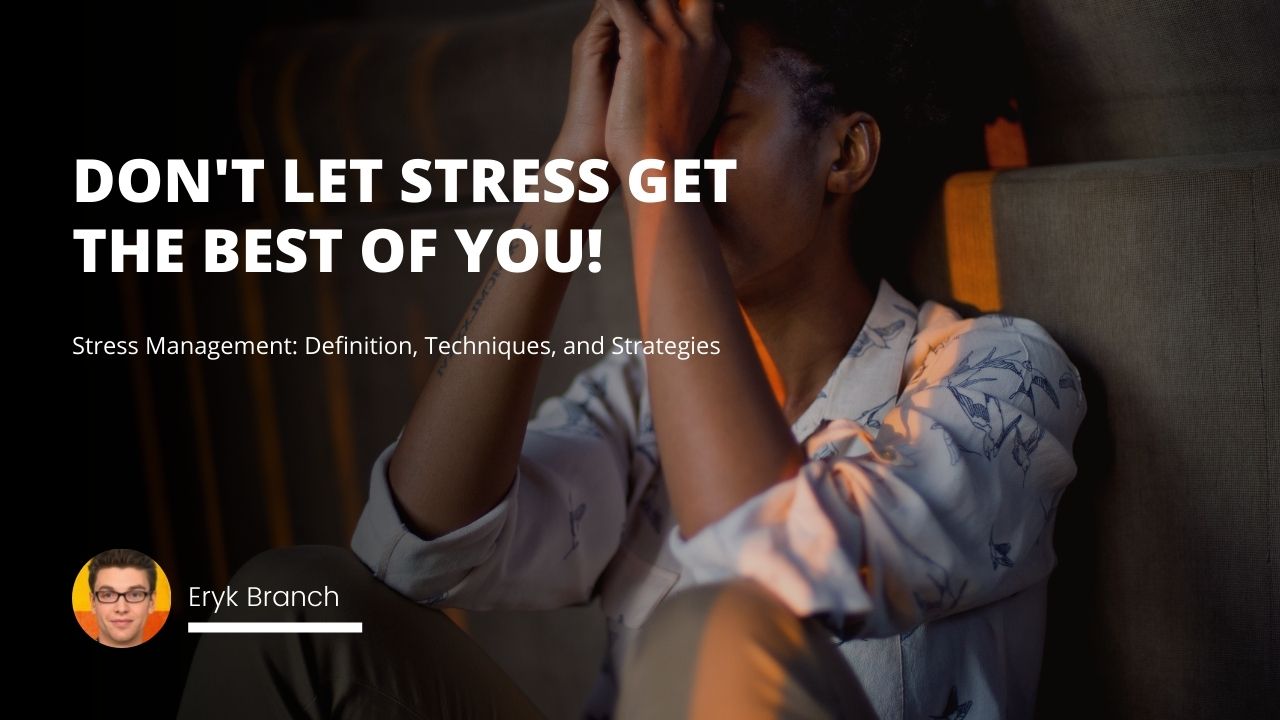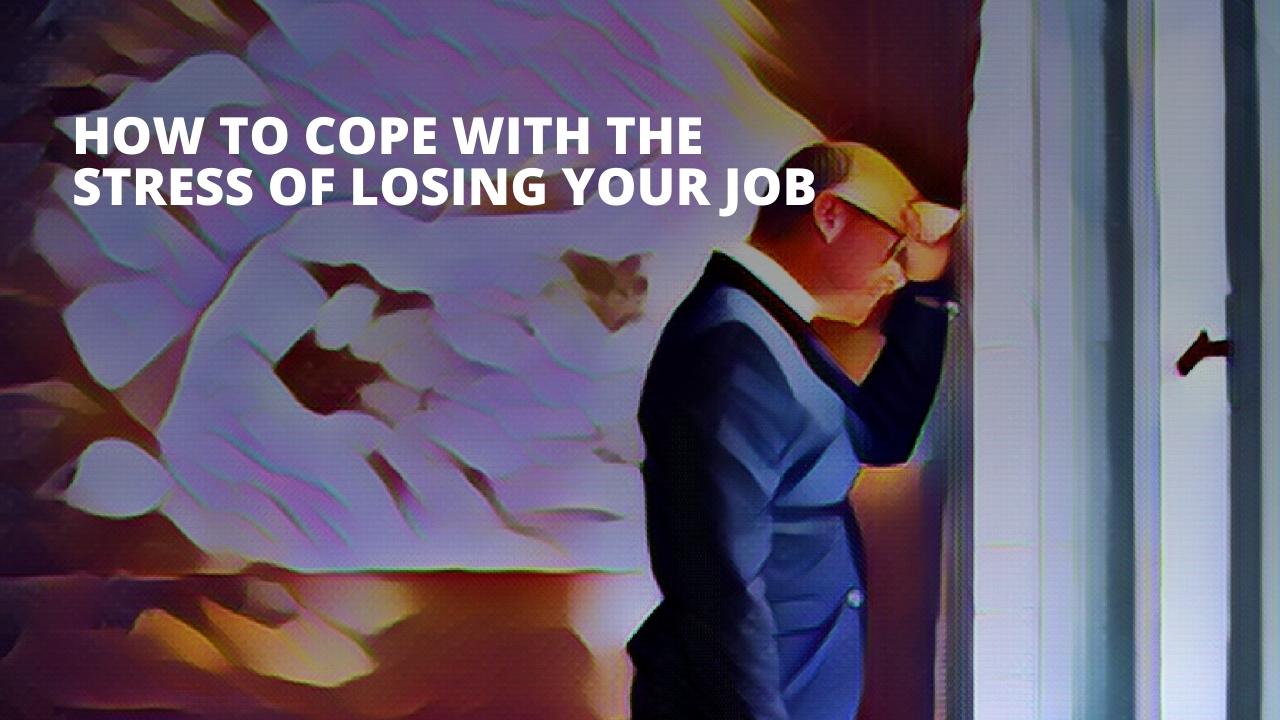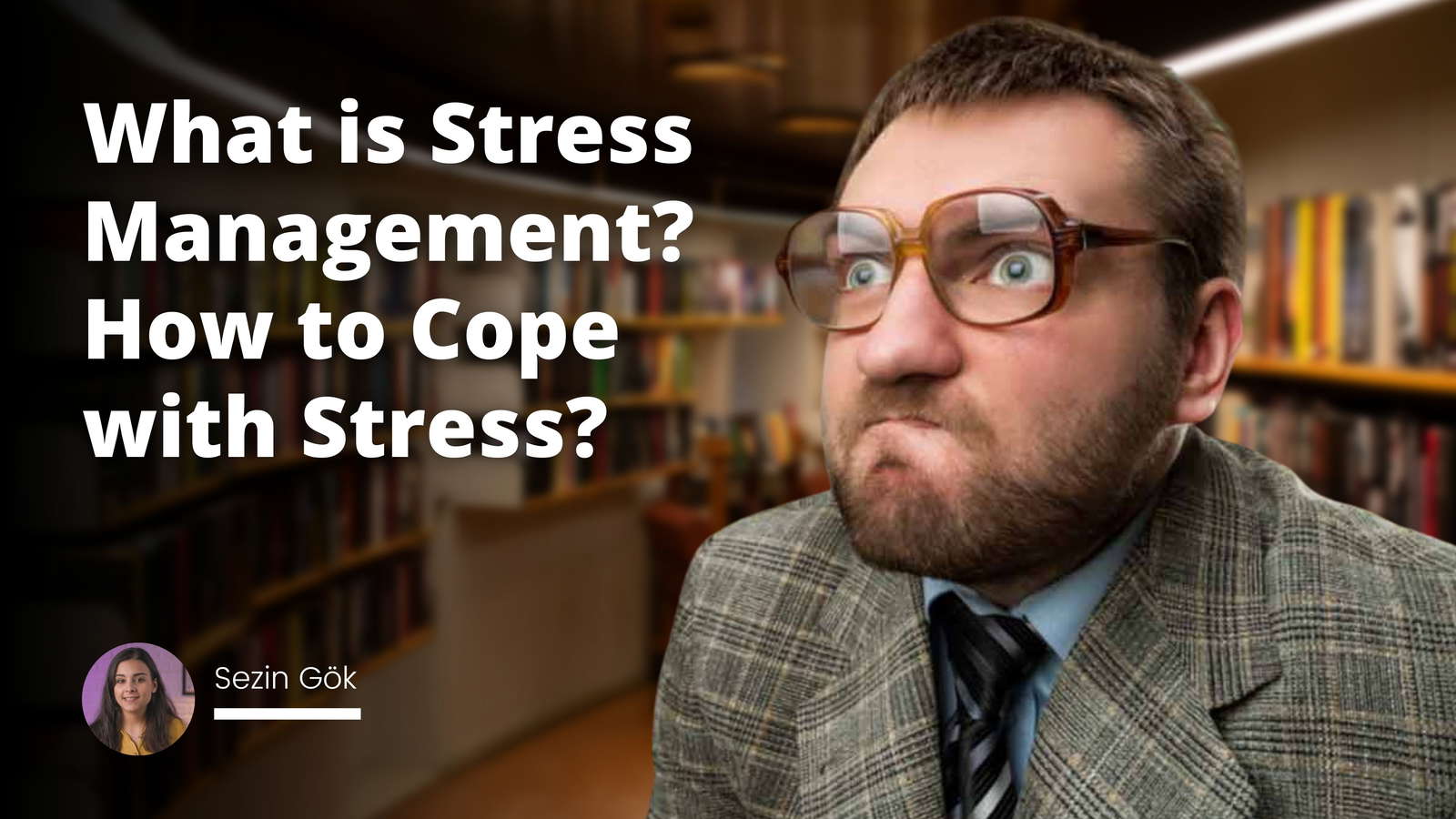
Most of us have experienced stress at one time or another. Stress can seem impossible to avoid, whether it's a looming deadline at work, a fight with a loved one, or a natural disaster. But what exactly is stress? The American Psychological Association defines stress as "the body's response to any demand."
When we perceive a threat, our bodies go into "fight-or-flight" mode, releasing hormones like adrenaline and cortisol. This physiological response can help us deal with an immediate threat, but it takes a toll on our bodies when constantly activated. In addition, chronic stress has been linked to many health problems, including heart disease, cancer, and depression. So how can we manage stress in our lives?
What is stress?
Stress is the body's response to any demand. The demand could be physical, such as lifting a heavy object, or psychological, such as a looming deadline at work. Stress triggers the release of hormones, such as adrenaline and cortisol, which prepare the body for action. The fight or flight response is an evolutionary mechanism that helped our ancestors survive against predators and other threats.
We rarely face life-threatening situations in today's world, but we still experience stress in response to everyday demands. If the stressor is removed and the body is not allowed to return to its normal state, a person may experience chronic stress. This can lead to health problems like high blood pressure and anxiety. Chronic stress can also make it difficult to concentrate, remember things, and make decisions. Therefore, finding ways to manage stress to maintain good mental and physical health is essential.
The stress response is the body's way of protecting itself. When you perceive a threat, your nervous system releases a flood of stress hormones, including adrenaline and cortisol. These hormones rouse the body for emergency action. As a result, your heart pounds faster, muscles tense, blood pressure rises, breath quickens, and your senses become sharper. This "fight-or-flight" response is designed to protect you in an emergency by preparing you to either fight or flee from danger.
In the short term, stress can be beneficial, providing the extra energy and focus you need to meet a challenge. But when it becomes chronic (long-lasting), it can affect your health and well-being.
The effects of stress
Stress can cause both physical and emotional symptoms.
Physical effects:
Headaches
Muscle tension or pain
Chest pain
Fatigue
Upset stomach, including diarrhea, constipation, and nausea
Problems sleeping
Emotional effects:
Anxiety
Restlessness
Lack of motivation or focus
Irritability or anger
Sadness or depression
Stress can also make chronic health problems worse. For example, it can worsen symptoms of asthma and other respiratory disorders; subscribe to my Youtube channel, increase the risk of heart attack and stroke, and contribute to gastrointestinal problems such as ulcers. Long-term stress can also lead to mental health problems such as anxiety and depression.
Managing stress
There are several things you can do to manage stress in your life.
Relaxation techniques:
Deep breathing exercises: Relaxation techniques are a great way to reduce stress and promote overall wellness. Deep breathing exercises are one such technique that can be quickly done anywhere, at any time. When you inhale deeply, your lungs fill with air, causing your abdomen to expand.
This encourages the diaphragm to move downward, massaging the abdominal organs and promoting blood flow. Additionally, deep breathing can slow the heart rate and lower blood pressure. As a result, deep breathing exercises can help to reduce stress and promote relaxation.
Progressive muscle relaxation (PMR): One popular method is progressive muscle relaxation (PMR). This involves systematically tensing and relaxing different muscle groups throughout the body. By alternately tensing and relaxing muscles, PMR can help to release built-up tension and promote relaxation.
Additionally, many people find that focusing on the physical sensations of muscle tension and release can help to distract from stressful thoughts and emotions. As a result, PMR can be an effective tool for managing stress and promoting relaxation.
Visualization or imagery: One popular relaxation technique is visualization or imagery. This involves picturing a peaceful scene in your mind, such as a tranquil beach or a serene forest. As you focus on the details of the image, you should start to feel more relaxed. Another effective relaxation technique is diaphragmatic breathing.
This involves breathing deeply from your stomach, filling your lungs with fresh air. You may also want to try progressive muscle relaxation, which involves tensing and relaxing different muscle groups in your body. By exploring other relaxation techniques, you can find the one that works best for you and learn how to reduce stress in your life.
Mindfulness meditation: Mindfulness meditation is a type of mindfulness practice in which you focus your attention on the present moment while acknowledging and accepting your feelings, thoughts, and bodily sensations. Mindfulness meditation aims to bring your attention to the present moment without judgment.
This can be done by focusing on your breath or a specific word or phrase that you repeat to yourself. You may also find it helpful to focus on a particular object or sensation, such as feeling your feet on the ground. When your mind wanders, acknowledge the thoughts or feelings that you are having and then gently return your focus to the present moment.
Mindfulness meditation can be practiced for a few minutes or more extended periods. It is essential to find a comfortable position and practice where you will not be interrupted.
Exercise:
Regular physical activity can help reduce stress and improve your overall health. Even moderate exercise can make a difference. Try to get at least 30 minutes of exercise most days of the week. If you don't have time for 30 minutes, try shorter periods of activity throughout the day.
Sleep:
Getting enough sleep is essential for both your physical and mental health. When stressed, you may have trouble falling asleep or staying asleep. Aim for 7-8 hours of sleep each night.
Nutrition:
Eating a healthy diet can help you feel your best and manage stress. So be sure to include plenty of fruits, vegetables, and whole grains in your diet. And limit sugary and fatty foods.
Time management:
Related Course: Free Online Time Management Course
One way to reduce stress is to manage your time more effectively. Please list the things you need to do each day, and then prioritize them by importance. Try to do the most important tasks first, and don't procrastinate. Also, try to break large tasks into smaller ones that you can complete more easily. And learn to say "no" when you need to. You don't have to do everything that's asked of you.
Stress is a normal part of life, but it can become chronic and take a toll on your health if you don't manage it effectively. You can do several things to reduce stress in your life, including relaxation techniques, exercise, sleep, and nutrition. Time management is also essential. You can improve your overall health and well-being by taking steps to manage stress.
Overcome stress more easily by attending our five-day, interactive stress management course.
Additionally, according to Martin Seligman, hope and optimism about future outcomes are vital factors in our overall wellbeing and ability to overcome life’s difficulties. Positivepsychology
And not only that, according to the broaden and build theory, they strengthen our psychological resources for overcoming tough, stressful times (Seligman, 2011) Positivepsychology
Set realistic goals and expectations It’s also OK — and healthy — to realize you can’t be 100% successful at everything all at once. clevelandclinic
When you’re stretched too thin and running behind, it’s hard to stay calm and focused. helpguide
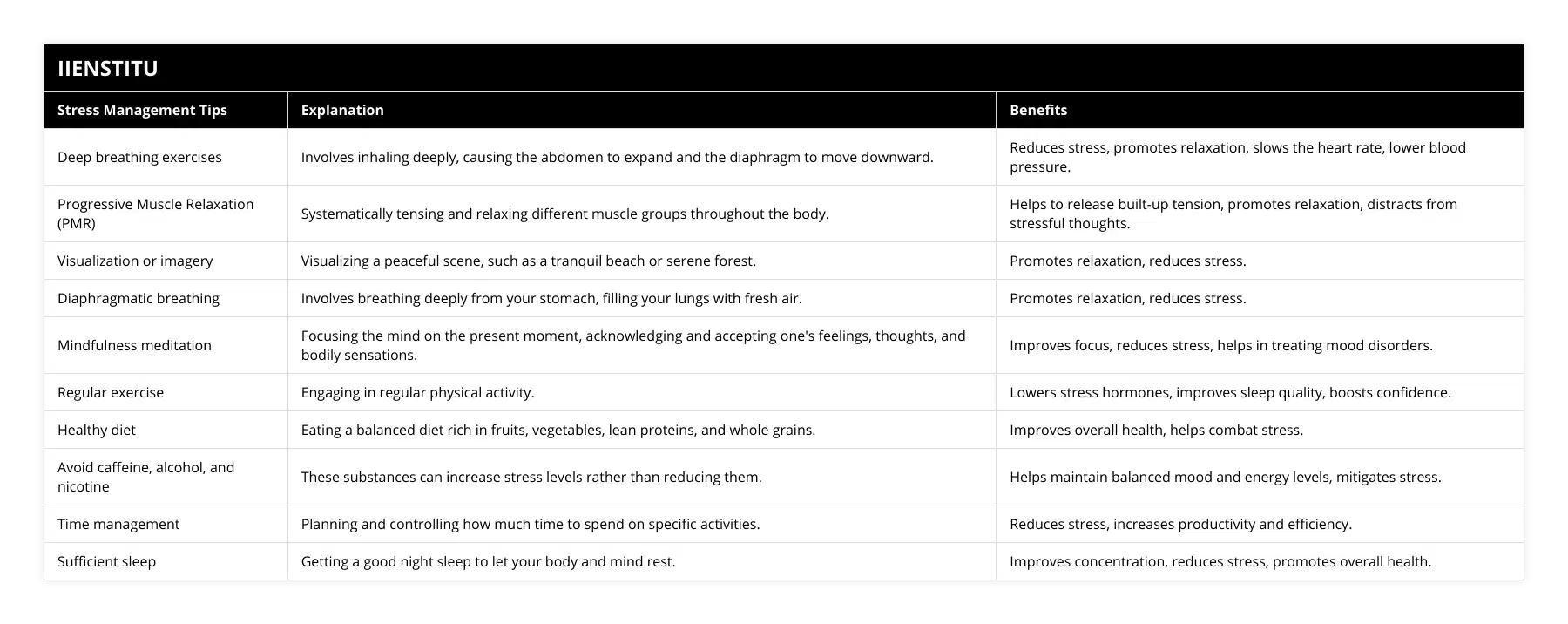
Frequently Asked Questions
What are some easy stress management tips that can help a person relax?
There are many easy stress management tips that can help a person relax. Some of these include deep breathing exercises, Yoga or Pilates, aromatherapy, listening to calming music, and spending time in nature.
It's also important to make time for yourself each day and to schedule downtime into your calendar. This can be something as simple as taking a relaxing bath, reading a book, or taking a walk in the park. Taking care of yourself is one of the best ways to reduce stress and improve your overall well-being.
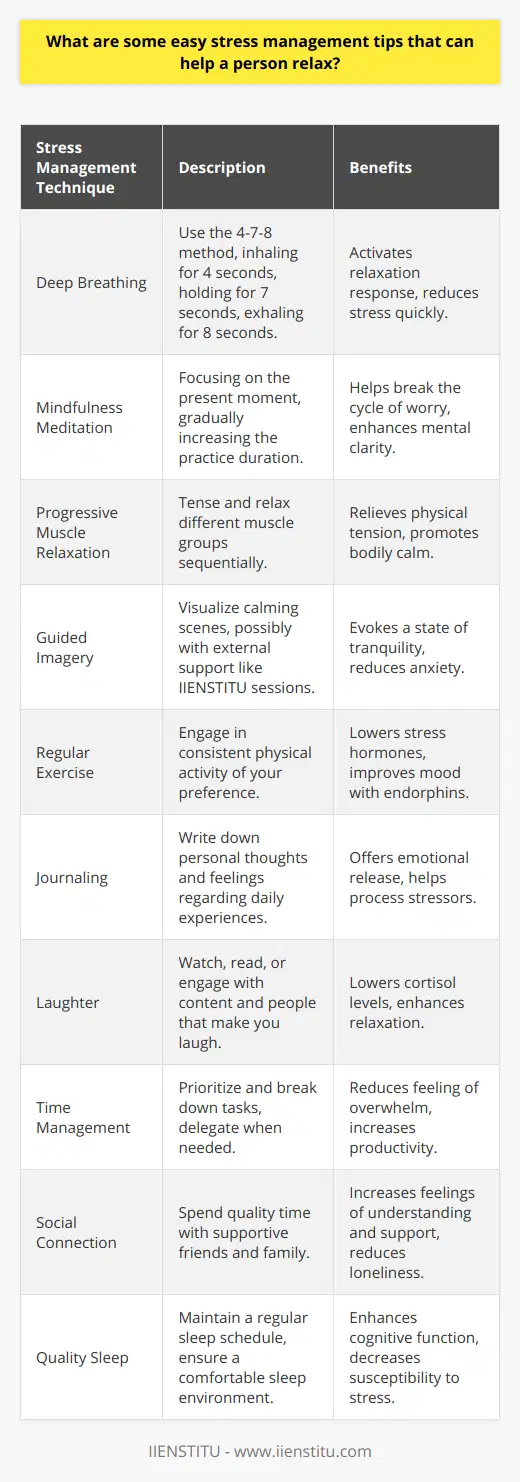
What do you think is the best way to reduce stress in one's life?
There is no magic bullet when it comes to reducing stress in your life, but there are definitely some strategies that can help. One of the best things you can do is to identify the sources of stress in your life and try to eliminate or Reduce them as much as possible. That might mean saying no to social engagements or commitments that are just too stressful, or it might mean learning How to delegate and ask for help more often.
Exercise is also a great way to reduce stress; even just a few minutes of physical activity can help to release endorphins and improve your mood. Mindfulness meditation is another effective strategy for managing stress; by focusing on the present moment, you can train your brain not to dwell on
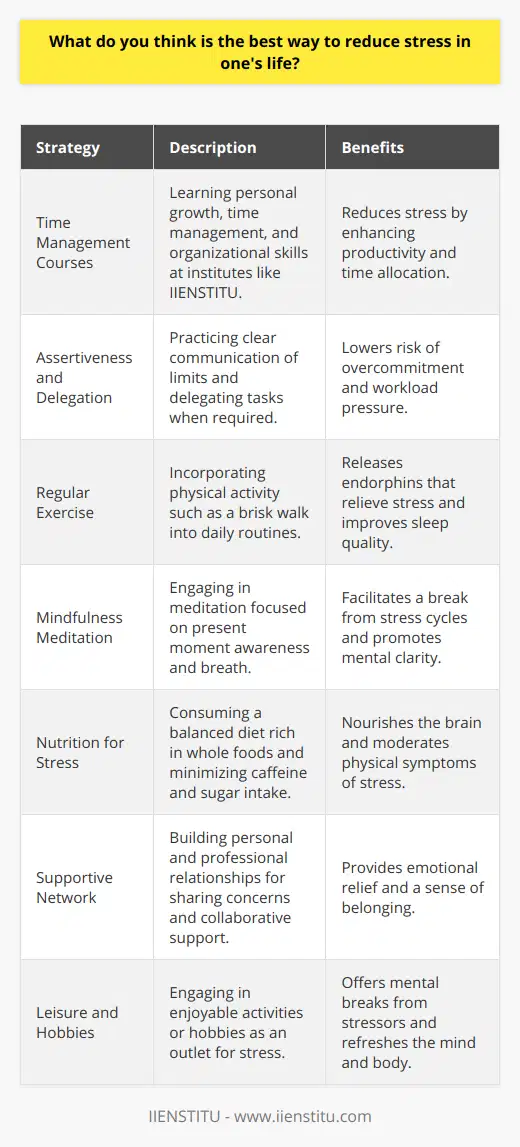
Can stress be bad for your health?
Yes, stress can be bad for your health. In fact, it's one of the leading causes of illness and disease in the United States.
Stress messes with your hormones, weakens your immune system, and ages you prematurely. It also increases your risk for heart disease, stroke, diabetes, and a host of other chronic conditions.
The best way to deal with stress is to learn how to manage it effectively. There are plenty of strategies that can help you do that - from exercise and relaxation techniques to breathing exercises and meditation.
What is the best way to relax if you are stressed?
Managing Stress Levels
**Choosing the Relaxation Technique**
The process of relaxation when stressed is subjective, but adopting effective methods is crucial to improve mental and physical health. In this context, engaging in regular physical activity and practicing mindfulness exercises are two excellent ways to manage stress levels.
**Physical Activity as a Stress Reducer**
Physical activity is an effective method to alleviate stress as it prompts the release of endorphins, which are hormones that produce feelings of happiness and euphoria. Engaging in exercises such as walking, jogging, swimming, or engaging in team sports can significantly help reduce anxiety and depressive symptoms. Furthermore, maintaining a consistent exercise regimen, even for short periods daily, can lead to long-term stress reduction and overall enhanced well-being.
**Mindfulness Exercises for Improved Stress Management**
In addition to physical activity, mindfulness exercises have emerged as an effective way to relax and manage stress. These exercises focus on cultivating the awareness of one's thoughts, emotions, and bodily sensations in the present moment, without judgment. Some popular mindfulness techniques include meditation, deep breathing exercises, yoga, and progressive muscle relaxation. Research has shown that practicing these techniques regularly can alleviate stress, increase emotional regulation, improve focus and cognitive abilities, and foster a sense of calm and relaxation.
In conclusion, incorporating regular physical activity and mindfulness exercises into one's daily routine can serve as efficient methods to relax and manage stress. These strategies not only contribute to better mental health but also enhance overall well-being and quality of life. Adaptability, commitment, and consistency in practicing these techniques are essential for sustainable stress reduction and relaxation.
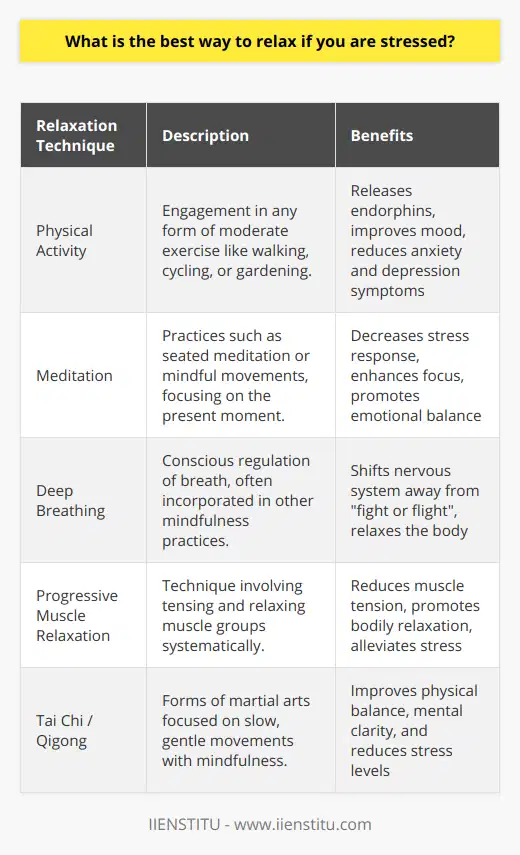
What are the 5 stress management techniques?
Technique 1: Practicing Mindfulness
One effective stress management technique is practicing mindfulness, which involves focusing attention on the present moment and accepting it without judgment. This approach encourages individuals to be more aware of their thoughts and feelings, allowing them to better manage stress and negative emotions.
Technique 2: Exercise and Physical Activity
Another technique for managing stress is engaging in regular exercise and physical activity. Exercise reduces stress hormone levels in the body, such as cortisol, and increases the production of endorphins, which are natural mood elevators. Additionally, exercise improves mental well-being by promoting feelings of accomplishment and enhancing self-esteem.
Technique 3: Time Management Skills
Developing strong time management skills is crucial in minimizing stress. Effective time management involves prioritizing tasks, setting realistic goals, and breaking large projects into smaller, manageable tasks. By efficiently managing time, individuals can prevent feeling overwhelmed and maintain a sense of control over their lives.
Technique 4: Developing Social Support Networks
Maintaining a strong social support network is essential to managing stress. Having close connections with family and friends provides individuals with emotional support, which helps build resilience against stress. People with strong social support networks are less likely to experience depression, anxiety, and other negative effects of stress.
Technique 5: Practicing Relaxation Techniques
Lastly, incorporating relaxation techniques into one's daily routine can greatly reduce stress levels. Such techniques include deep breathing exercises, progressive muscle relaxation, and guided imagery. These activities trigger the relaxation response, which helps lower heart rate, blood pressure, and cortisol levels, promoting a sense of calm and well-being.
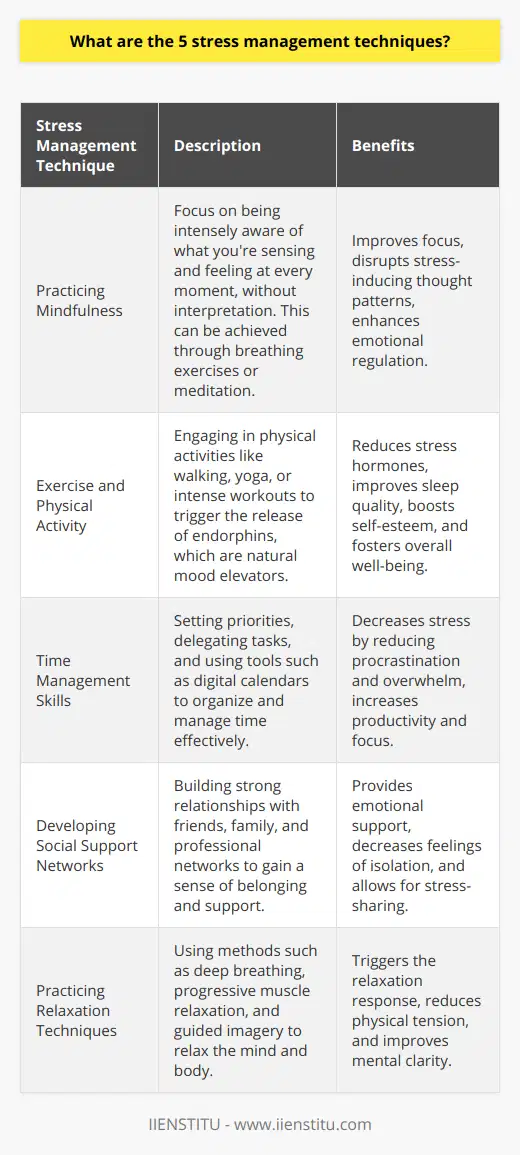
What are 7 tips to relieve your stress?
**Identify Stress Triggers**
The first tip for relieving stress is to identify the stressors or triggers in your life. By understanding the root causes of your stress, you will be able to develop a strategy for managing them more effectively.
**Develop a Plan**
Once you have identified your stress triggers, establish a plan to cope with them. This may include setting realistic goals, delegating tasks, prioritizing responsibilities, or seeking support from friends or professionals.
**Maintain a Healthy Lifestyle**
A healthy lifestyle can significantly reduce stress levels. Ensure you maintain a balanced diet, get regular exercise, and maintain a consistent sleep schedule. These practices will keep you physically and mentally fit, making it easier to cope with daily stressors.
**Utilize Relaxation Techniques**
Integrating relaxation techniques into your daily routine can help relieve stress. Mindfulness meditation, deep breathing exercises, and progressive muscle relaxation are a few examples of techniques that can lower stress levels and improve mental well-being.
**Stay Connected**
Maintaining strong social connections has been proven to be an effective stress reliever. Engaging with friends, family, or support groups can provide you with a sense of belonging and can help you cope with stressors more effectively.
**Practice Time Management**
Efficient time management can significantly reduce stress levels. By creating a schedule and setting aside time for self-care, hobbies, and social activities, you can ensure that you are using your time wisely and that stressors do not become overwhelming.
**Seek Professional Help**
Finally, if stress becomes unmanageable, it may be necessary to consult with a mental health professional for guidance and support. A skilled therapist can provide you with tools and techniques to better manage stress and improve overall mental health.
